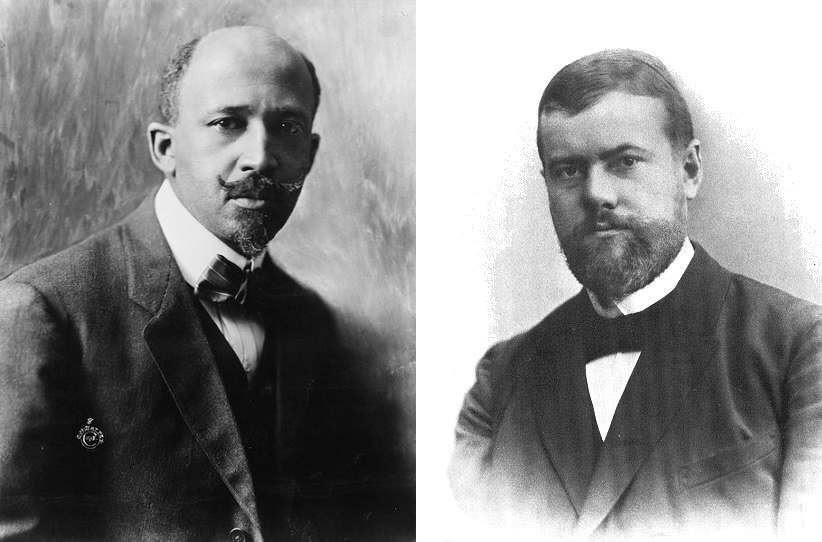An Introduction to the African American Intellectual Heritage Book Series
In today’s post, I sit down with Professors Patrick B. Miller and Paul Spickard to discuss their book series, The African American Intellectual Heritage, for the University of Notre Dame Press. This series serves two important projects in African American Intellectual History. First, the editors are reprinting out-of-print works by African American intellectuals in order to amplify their voices within the historical record. These new editions contain introductions from leading scholars and up-to-date bibliographies. Second, the series promotes books that further discussions on the history of African American intellectual life and on ideas about race.
 Patrick B. Miller is a Professor of History at Northeastern Illinois University. His research interests include African American History, Sport History, and Citizenship and Identity in Comparative Perspective. He is the co-author of The Unlevel Playing Field: A Documentary History of the African American Experience in Sport with David K. Wiggins, co-edited Sport and the Color Line: Black Athletes and Race Relations in Twentieth-Century America with David K. Wiggins, and edited The Sporting World of the Modern South.
Patrick B. Miller is a Professor of History at Northeastern Illinois University. His research interests include African American History, Sport History, and Citizenship and Identity in Comparative Perspective. He is the co-author of The Unlevel Playing Field: A Documentary History of the African American Experience in Sport with David K. Wiggins, co-edited Sport and the Color Line: Black Athletes and Race Relations in Twentieth-Century America with David K. Wiggins, and edited The Sporting World of the Modern South.
 Paul Spickard is a Professor of History at the University of California, Santa Barbara. His research focuses on the experiences of ethnic minorities throughout the world with a focus on the United States and East Asia. He is the author and editor of many works including Race in Mind: Critical Essays, Multiple Identities: Migrants, Ethnicity, and Membership (editor), Almost All Aliens: Immigration, Race, and Colonialism in American History and Identity, and Red and Yellow, Black and Brown: Decentering Whiteness in Mixed Race Studies edited with Joana Rondila and Rudy Guevarra.
Paul Spickard is a Professor of History at the University of California, Santa Barbara. His research focuses on the experiences of ethnic minorities throughout the world with a focus on the United States and East Asia. He is the author and editor of many works including Race in Mind: Critical Essays, Multiple Identities: Migrants, Ethnicity, and Membership (editor), Almost All Aliens: Immigration, Race, and Colonialism in American History and Identity, and Red and Yellow, Black and Brown: Decentering Whiteness in Mixed Race Studies edited with Joana Rondila and Rudy Guevarra.
Keisha Blain: Over the last several years, the field of African American Intellectual History has been gaining increasing momentum. Tell us more about some of the current trends in the field. What are the key issues and concerns that scholars are currently addressing?
Patrick B. Miller: One of the biggest concerns among practitioners in the field is the very phrase “intellectual history.” This isn’t a worry among scholars, but historically, the term may have set the field apart in many peoples’ minds—along the lines of the distinctions between “analytical history” and a more widely appreciated notion of “narrative non-fiction.”
I think that one of the most significant recent developments in African American Intellectual History has been its accessibility to a broader readership—and maybe this should be put in more emphatic terms—the insistence by many authors (and presses) about the connections between their texts and reflections of today’s everyday concerns and commitments. We read Baldwin’s The Fire Next Time as the touchstone for Jesmyn Ward’s collection The Fire This Time, even as we know that reading Ta-Nehisi Coates’s Between the World and Me requires that we recall the fury of Richard Wright.
In a very important way, African American Intellectual History dissolves many of the historic distinctions between academics (still often rendered as ‘Ivory Tower’ intellectuals) and public intellectuals. As a writer of classroom syllabi, for instance, I simply cannot make an old-school distinction: Henry Louis Gates, Cornel West, and Michael Eric Dyson are pretty seriously institutionalized in their formal titles—so too are Maya Angelou, Toni Morrison, Claudia Rankine, Nell Irvin Painter, and Natasha Trethewey. But my students are understanding them—and lingering over the compelling works of Kara Walker and Carrie Mae Weems—as public intellectuals in the age of Barack Obama.
Let me add that the power of memoir and autobiography—as well as the icons of injustice and tragedy that sit atop today’s headline news—has informed African American Intellectual History at least since the time of David Walker, Frederick Douglass, and W.E.B. Du Bois. So the traditions inform the innovations, and I see that in works ranging from Black Scholars on the Line to the Charleston Syllabus.
Blain: Tell us more about your book series—the African American Intellectual Heritage series at the University of Notre Dame Press. When did it begin? What are the main goals and/or themes of the series? What kind of projects are you looking for?
Paul Spickard: Credit for starting this series goes to Barbara Hanrahan, legendary editor of outstanding scholarly books at several presses. She had published one of my early books and I had expressed my dismay that many important books by African American scholars and public intellectuals were long out of print—people like Carter G. Woodson, E. Franklin Frazier, Anna Julia Cooper, Ida B. Wells, Charles S. Johnson, Walter White, even W.E.B. Du Bois. When Barbara became head of the press at Notre Dame, she remembered our conversation and asked me to edit the series. Barbara and I believed that the intellectual heritage of African Americans is a precious legacy that is vital to all Americans and that should be known by all Americans.

We hoped the series would bring out books in four categories: classic books in the African American intellectual discourse; new books written about African American intellectual history; new books that are themselves markers in the African American intellectual tradition; and books that open up our ideas about race itself.
Soon we realized that editing this series was going to be a too big a task for one editor, so Barbara and I recruited Patrick Miller, a historian of African America, to join me as series co-editor. Barbara has more recently moved on from the University of Notre Dame Press, but we carry on with the series to which she gave birth.
Blain: One of the books in the series is Black Scholars on the Line: Race, Social Science, and American Thought in the Twentieth Century edited by Jonathan Scott Holloway and Ben Keppel. Tell us more about this book and how it reflects the major themes of the series.
Spickard and Miller: Black Scholars on the Line is in many ways the flagship book in our series. Patrick had the larger hand in editing it. It is such a brilliant intervention by Professors Holloway and Keppel. It lays out the history of Black social scientific thought (conceived very broadly to include activists and public intellectuals as well as sociologists, political scientists, and other formal academics) in six parts, each presenting five or six seminal essays. The long introduction is the best analytical summary of Black intellectual history I know of. Each of the sections has its own introduction as well.
The writings range in time from Alexander Crummell and George Washington Williams in the latter decades of the nineteenth century, through almost all the great figures in Black intellectual history (Woodson, Du Bois, Hurston, Sterling Brown, Horace Mann Bond, Abram L. Harris, Ralph Bunche, Mary McLeod Bethune, Kenneth and Mamie Clark, and a dozen more), down to the 1990s with Joyce A. Ladner, Mae C. King, and William Julius Wilson.
The master questions are academic, but they are also personal and political: What does it mean to be an African American? How has that changed and not changed over time? What is a social science, what is a Black social science, and what difference is a Black social science capable of making in our society? These, and a host of other questions that swirl around them, are the kinds of questions that animate the core of our series.
Blain: Tell us more about what we can expect to see in your book series over the next year or two? Are there any specific books you would like to highlight?
Spickard and Miller: Chris McAuley has a second book soon to come out in our series: The Spirit vs. the Souls: Weber, Du Bois and the Politics of Scholarship. It is a comparative analysis of the scholarly work and political positions of Max Weber and W.E.B. Du Bois. These two eminent sociologists knew each other briefly early in the last century, they corresponded for a while, and there were some parallels in their thinking. But the differences were also substantial, and those differences were in the end political. Weber de-emphasized the contribution that empire and unfree labor made to the creation of capitalism; for Du Bois, unfree labor and empire were the lynchpins to the burgeoning international capitalist order. McAuley works from the two men’s ideas as much as he does from historical archives, as he traces the development of their thinking and its implications.

McAuley’s book, which we hope will come out next year, is an example of intellectual history at its very best. Like Professor McAuley’s first book, it is a thoughtful analysis of the thought of a major thinker (in this case, two thinkers). But The Spirit vs. the Souls may turn out to be a marker in African American intellectual history in its own right.
We are looking for more good books on African American intellectual history. We hope for studies of individual thinkers like Nell Irvin Painter, Anna Julia Cooper, Zora Neale Hurston, Howard Thurman, Kelly Miller, and Allison Davis. There is a cottage industry in James Baldwin studies, but there may be more we need to know about him (I certainly turn back to him again and again). What other figures have been deeply influential in the African American intellectual tradition? George Schuyler? Can we cast Jesse Jackson as an intellectual or only as a political figure?
We are also on the lookout for manuscripts that trace a theme through Black intellectual history. A book on race and the human genome would not be out of order.
Blain: What advice would you give to prospective authors who are writing books in the field of African American Intellectual History? For those who are interested in publishing a book in your series, what should they keep in mind as they finalize their book proposals? What is the formal submission process?
Spickard: If you have an idea for a book that might fit our series, please let us know about it. Patrick’s email address is pbmiller@neiu.edu; mine is spickard@history.ucsb.edu. Our editor at the University of Notre Dame Press is Stephen Little, slittle2@nd.edu. He’s a smart guy. Any of the three of us can be the person with whom you make first contact.
The thing to do is to contact us with a book proposal. If you go to my website, you will find some things that will help you. Scroll down to the bottom to “Stuff for Graduate Students.” Among the things there are “How to Publish a Book” and “”Book Prospectus Guidelines.” Read those and follow their advice. More than fifty former graduate students have followed those guidelines and every one of them has won a book contract. If any of your readers or colleagues needs examples of book proposals that have worked, I can send some.
If Stephen, Patrick, and I think the project has the potential to be a good book, we will probably ask you for sample chapters or, if it is ready, the whole manuscript. The process is outlined in “How to Publish a Book.” We are committed, as you are Keisha, to the field of African American Intellectual History. We want to see lots of good books published in this area.
Copyright © AAIHS. May not be reprinted without permission.
